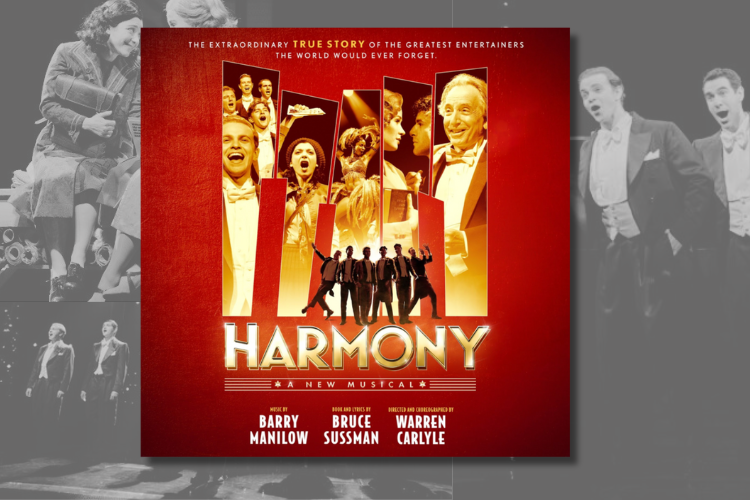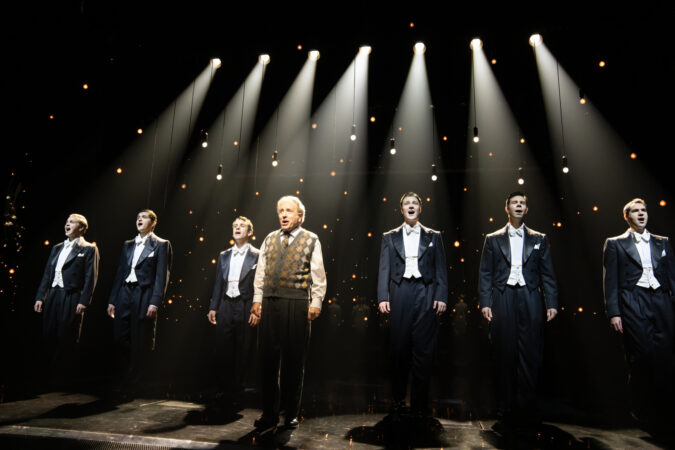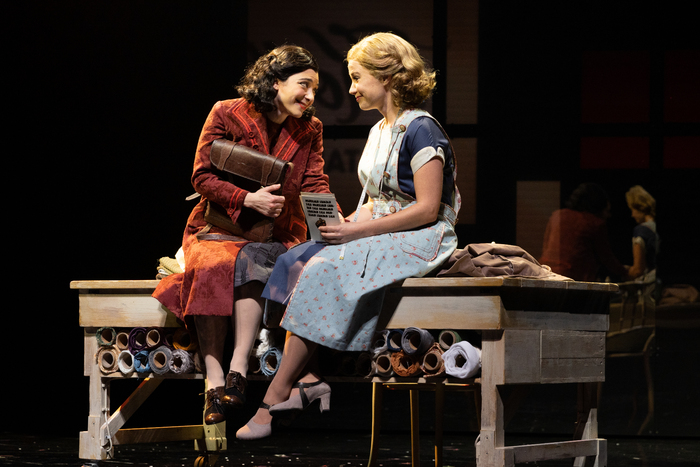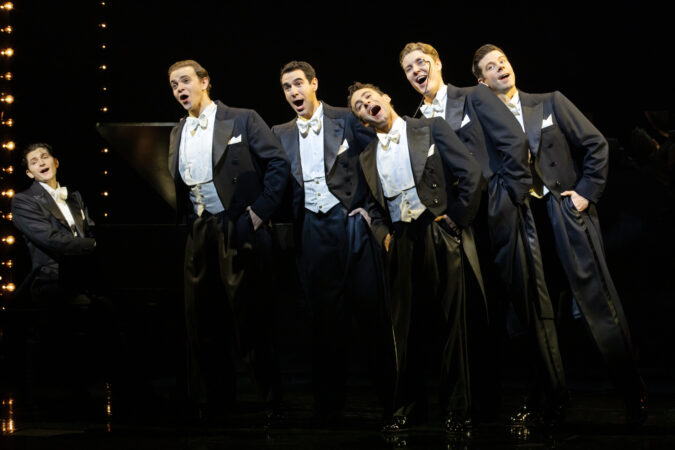
Sitting Down With the Cast of “Harmony”
All three young Jewish principal actors in Harmony, the new musical by Bruce Sussman and Barry Manilow that’s opening on Broadway after thirty years in the making, were in Fiddler On The Roof. Zal Owen played Perchik, Hodel’s revolutionary suitor, at StageDoor Manor, the famed theater camp, before playing Motel on the National Tour with Harvey Fierstein. Julie Benko played Hodel at her childhood JCC when she was 14 years old before going on to cover four out of five daughters on Broadway (and ultimately performing each one). And Danny Kornfeld played Yussel the Hatmaker as a Musical Theater Apprentice at Barrington Stage Company. Now, they are originating new Jewish roles on Broadway, bringing to life the fraught world in a pre-WWII Germany full of music and teetering on the brink of fascism. I sat down with them to talk about their process, their art, and their Judaism.

Harmony is a memory musical. The celebrated actor Chip Zien plays one of the six Comedian Harmonists, an actual half-Jewish half-gentile singing comedy group in the 1930s. Zien’s character is looking back on his experiences with equal parts joy and regret. Zien is Harmony’s narrator and mostly referred to as “Rabbi,” his onstage moniker as part of the Comedian Harmonists. Danny Kornfeld, who is making his Broadway debut, plays the younger version of Zien. “Rabbi grew up near Lodz, during pogroms, and witnessed horrors at a young age,” Kornfeld explains. His approach centered on finding Rabbi’s optimism while plumbing the question of hindsight and foresight: “Coming from such horrors, how did Rabbi not see horrors ahead?” As part of his preparation, he read Victor Frankl’s Man’s Search for Meaning and spent hours watching Zien in workshops and rehearsals, figuring out how to join the older and younger versions of the same character gesturally and spiritually. Kornfeld added his own idiosyncrasies, too: “I love snacks, so the young Rabbi loves snacks. I requested a turkey sandwich with mustard and whole wheat bread to eat onstage.”
Zal Owen, who has previously appeared on Broadway in The Band’s Visit, plays Harry, another member of the Comedian Harmonists, the founder of the group. “I’ve been preparing for this role my whole life,” Owen says, “It’s bashert.” He wrote his college essay about his earliest memories of singing: sitting next to his father in synagogue, learning the harmonies to “Etz Chaim Hi,” the traditional melody sung when the Torah is returned to the Ark. And the character he plays, Harry, roots his love of music in similar moments. All of these characters are based on actual historical figures, and Owen managed to find letters from a relative of the actual Harry Frommerman. Harry’s journey, like Rabbi’s, is one of disillusionment. “I start hopeful and youthful, but by the end, Harry has lost everything.” Owen’s Harry keeps a suitcase under his bed at all times; he is constantly fleeing. In rehearsals, Owen found the psychological gesture of forever packing and unpacking. Towards the end of the show, Harry is the one with the “only line in the show that’s all caps” when the Nazis are increasingly bearing down on the Comedian Harmonists and he demands: “RAISE THE DAMN CURTAIN. NOW.”

Unlike Harry and Rabbi, Julie Benko, fresh off her star turn as the understudy turned fan favorite in Funny Girl, plays a character not in the Comedian Harmonists. Benko, the newest principal in Harmony, plays Ruth, a smart-mouthed Bolshevik and the only Jewish female character on Broadway in the 2023 season. Ruth is not a religious Jew–she identifies first and foremost as a German and marries one of the gentile Comedian Harmonists leading her character down a complicated and difficult path in 1930s Europe. Benko quotes Marx when she talks about Ruth for whom “religion is the opiate of the masses.” In Harmony, Benko sings “Where You Go” with Sierra Boggess in one of the musical’s most heart wrenching turns. Benko doubles down on humor and resilience in her portrayal of Ruth: after the true presence and nature of the Nazis is first felt in Harmony, Ruth rushes to Harry and picks him up off the floor. “We will fight this. We can fight this,” she says. It’s a moment of solidarity, and Owen and Benko both feel it. In fact, the second part of the line was added during rehearsals.
In this musical, actual Jews play the Jews (which doesn’t happen as often as it could). “There’s a depth and history we bring,” Benko says as Danny Kornfeld adds, “The representation is important and necessary. And feels unfortunately special right now.” There’s a Jewish wedding onstage that Benko and Owen helped stage more truly to Jewish traditions, complete with chuppahs and circling and glasses about to be broken. Benko recalls spinning around her husband, musician Jason Yeager, at her own wedding, “I whispered in his ear, I’m warding off Lilith for you!”

Like Ruth, Benko is Jewish and an atheist. For her, Judaism is “an ethno-religion about family.” She connects to it “through music and language.” She has been a diligent student of Yiddish: “I’ve been doing Yiddish Duolingo so I can speak and sing in the language of my ancestors.” Kornfeld considers himself “reformed” with Judaism as his “chosen” family. He kvells when I ask him about his religious background: “I am so lucky to have a religion that inspires questions. It’s worth believing in something that lets you ask why.” And Zal Owen identifies with the conservative Jewish movement; he grew up keeping kosher, attending Solomon Schechter and USY in what he calls a “relatively religious household for an actor.”
Owen doesn’t shy away from the big questions. “We are living through an unprecedented rise in anti-semitism. At the end, we sing ‘Stars In The Night.’ We are asking the audience: how can we let this happen again? Maybe we’re not just asking the audience. Maybe we’re asking God or a higher power. And I’m not just talking about Jewish hate. Any hate.” Benko echoes, “It’s a story about allyship. 3 Jews, 3 gentiles in the Comedian Harmonists who supported each other. All six survived. It’s a model for how we can be better allies.” And Kornfeld wraps it up: “When times feel dark, surround yourself with chosen people and family. That way there’s still hope.”



